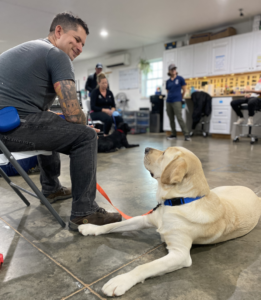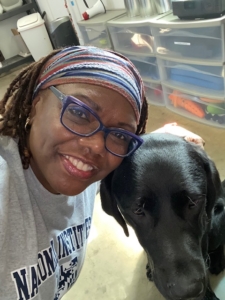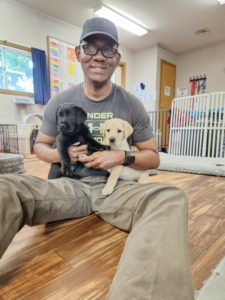Keisha Peterson-Anderson: A Healing Journey Through Warrior Canine Connection
 We are privileged to introduce you to U.S. Navy IT3 Keisha Peterson-Anderson, whom we met through Warrior Canine Connection’s (WCC) Mission Based Trauma Recovery (MBTR) training program in partnership with Wounded Warrior Project (WWP). We are honored to share her Warrior story.
We are privileged to introduce you to U.S. Navy IT3 Keisha Peterson-Anderson, whom we met through Warrior Canine Connection’s (WCC) Mission Based Trauma Recovery (MBTR) training program in partnership with Wounded Warrior Project (WWP). We are honored to share her Warrior story.
U.S. Navy IT3 Keisha Peterson-Anderson was working at the Pentagon on September 11, 2001—the day American Airlines Flight 77 was hijacked and crashed into the building, killing all 64 people on the plane and 125 people in the Pentagon.
Two weeks would pass before Keisha received official confirmation that Kevin, a dear friend and colleague who worked in another side of the building, had died in the horrific tragedy.
“I did what most people do, you grieve and try to move on,” said Keisha. “But I wasn’t really grieving, I was in shock. I got up and went to work every day … I look back now and wonder how I was functional. I literally went to work the day after 9/11.”
Keisha served 8 years and 10 months of active duty before separating from the Navy in late 2001. She remained in the D.C. area and became a government contractor working in various organizations in the IT and intel field. But emotionally, Keisha says she was just ‘going through the motions.’
After some persuasion from a friend, Keisha attended a Wounded Warrior Project (WWP) event. She felt great camaraderie with fellow brothers and sisters in arms, and attended multiple functions, including an Odyssey (retreat), Soldier Rides, and other local activities and outings. Slowly but surely, the events became the impetus for Keisha to start therapy.
It was at one of those local events that Keisha heard Sarah Olson from WCC speak about the organization’s MBTR training program.
“Every day on Earth is an ongoing sense of therapy,” says Keisha. “When things happen to you as a person, you can’t just go to eight therapy sessions and be healed. I was really living a half-normal life because of the trauma I experienced.”
Not only did Keisha complete the 8-week MBTR program, but so did her son, Taryn, 15.
“Being at WCC was so therapeutic to me,” said Keisha. “We were never really into dogs before, but it made me feel like I had a need, and this animal was here to help and had a need itself. The training was freaking amazing for me and my son. That training, although completed, is still soothing to me, and helping me to get over something that happened 22 years ago. It brought a lot of wonderful feelings and resolve to our every day.”
In fact, the experience, coupled with her ongoing therapy, impacted Keisha so much that she is now on the WCC waitlist for a service dog.
To learn more about WWP’s programs, visit www.woundedwarriorproject.org. For more information about WCC’s MBTR program, visit www.warriorcanineconnection.org.
###
 Warrior Canine Connection’s (WCC) MBTR training program, short for Mission Based Trauma Recovery, is the cornerstone of its mission. This unique volunteer-based, animal-assisted therapy involves Service Members and Veterans in training future service dogs. Besides knowing the dog will one day go on to help a fellow Veteran, many Warriors involved in MBTR cite their own benefits, including enhanced communication, confidence, accountability, emotional regulation, and patience.
Warrior Canine Connection’s (WCC) MBTR training program, short for Mission Based Trauma Recovery, is the cornerstone of its mission. This unique volunteer-based, animal-assisted therapy involves Service Members and Veterans in training future service dogs. Besides knowing the dog will one day go on to help a fellow Veteran, many Warriors involved in MBTR cite their own benefits, including enhanced communication, confidence, accountability, emotional regulation, and patience.
 Today we introduce you to U.S. Air Force Major (ret.) April Ames-Chase. She’s a Veteran who Warrior Canine Connection (WCC) had the good fortune to meet through its Mission Based Trauma Recovery (MBTR) training program in partnership with Wounded Warrior Project (WWP). We are privileged to share her story.
Today we introduce you to U.S. Air Force Major (ret.) April Ames-Chase. She’s a Veteran who Warrior Canine Connection (WCC) had the good fortune to meet through its Mission Based Trauma Recovery (MBTR) training program in partnership with Wounded Warrior Project (WWP). We are privileged to share her story. Military service is a family tradition for Retired U.S. Army Sergeant Mike Milton; his brother, sister-in-law, cousin, and uncles, all served in the Armed Forces.
Military service is a family tradition for Retired U.S. Army Sergeant Mike Milton; his brother, sister-in-law, cousin, and uncles, all served in the Armed Forces.

